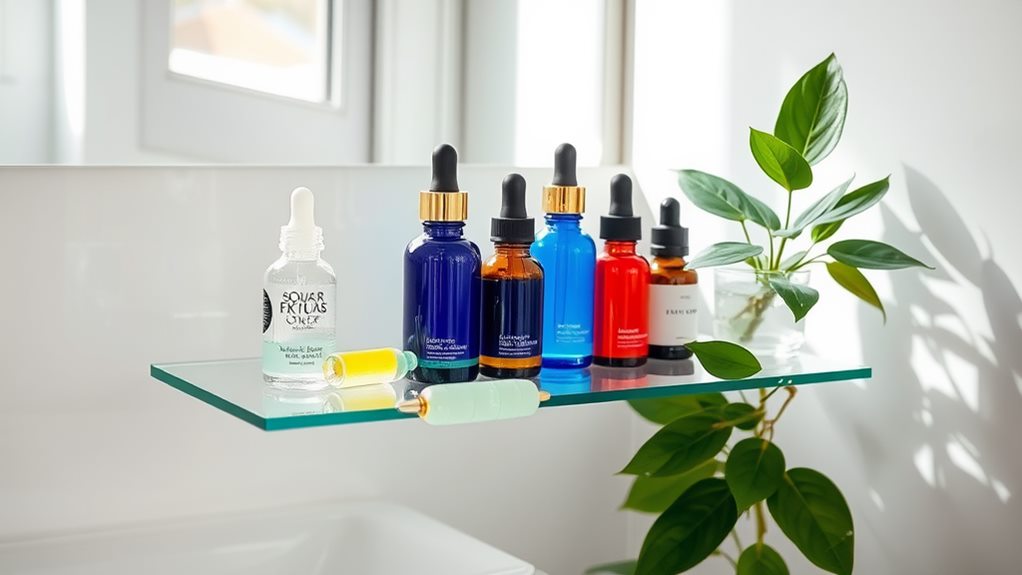Sunscreen Myths Debunked- What You Really Need to Know
Sunscreen myths are everywhere, but let’s set the record straight! You need sunscreen even on cloudy days because UV rays still reach you. Dark skin tones need protection too; it’s not a free pass to skip sunscreen. Remember, no sunscreen is waterproof—if you’re swimming or sweating, reapply every two hours. And don’t be fooled by high SPF numbers; they don’t mean you can stay out longer without reapplying. Always check the expiration date and store your sunscreen in cool places to keep it effective. Stick around, and you’ll uncover even more sunscreen secrets to protect your skin!
Common Myths About Sunscreen
Although many people rely on sunscreen to protect their skin, several myths about its effectiveness can lead to misunderstandings. One common myth is that you only need sunscreen on sunny days. Surprise! UV rays can reach you even on cloudy days, so slather on that sunscreen no matter the weather.
Another myth is that you don’t need to apply sunscreen if you have darker skin. While it’s true that darker skin has some natural protection, it’s not enough to skip sunscreen altogether.
You might think you’re safe if you’re in the water. Well, water can wash away your sunscreen, so make sure to reapply after swimming.
And don’t forget, sunscreen isn’t just for beach days. You need it every day, even when you’re just running errands or hanging out in the park.
Lastly, some folks believe that a higher SPF means you can stay in the sun longer. Not quite! Higher SPF does offer more protection, but you still need to reapply regularly.
SPF: Understanding the Numbers
When it comes to sunscreen, understanding SPF numbers is essential for choosing the right level of protection. SPF stands for Sun Protection Factor, and it tells you how well a sunscreen can protect your skin from UV rays.
For example, if you usually burn after 10 minutes in the sun, an SPF 30 sunscreen could let you stay out 30 times longer, or about 300 minutes, before burning—at least in theory!
But don’t get too excited! The protection isn’t perfect. An SPF 30 blocks about 97% of UVB rays, while SPF 50 blocks about 98%. So, going higher doesn’t mean a whole lot more protection.
If you’re outside, you still need to reapply every two hours, or more often if you’re sweating or swimming.
Also, don’t forget that no sunscreen can block 100% of UV rays. So, even if you slather on that SPF 50, it’s a good idea to seek shade and wear protective clothing.
Water Resistance: What It Means
Understanding water resistance in sunscreen is essential for anyone planning to spend time in the sun and water. You might think that if a sunscreen says it’s water-resistant, you’re good to go, right? Well, not exactly!
Water resistance simply means that the sunscreen can protect your skin for a certain amount of time while you’re sweating or splashing around. Most products are tested for either 40 or 80 minutes of water resistance, which means they’ll last that long before you need to reapply.
But remember, it doesn’t mean it’s waterproof! After swimming, towel drying, or even lots of sweating, you should reapply your sunscreen. Think of it like a superhero with a time limit; it can protect you, but it has to recharge after a while!
Also, keep in mind that the effectiveness can vary based on how much sunscreen you apply. If you’re only using a little bit, it won’t work as well.
Application Techniques for Effectiveness
Applying sunscreen correctly is key to maximizing its effectiveness, especially after swimming or sweating.
First, you need to apply enough sunscreen. A good rule of thumb is to use about a shot glass full for your entire body. You wouldn’t want to skimp on your protection!
Next, make sure you apply it about 15 to 30 minutes before heading outside. This allows your skin to absorb it properly.
Don’t forget those often-missed spots like your ears, the back of your neck, and even your feet. Yes, sandals can leave you vulnerable to sunburn!
When it comes to reapplying, you should do so every two hours, or more often if you’re swimming or sweating.
If you’re using a spray sunscreen, remember to spray it generously and rub it in for even coverage.
Expiration Dates and Product Safety
Sunscreen isn’t just about slathering it on; you also need to pay attention to its expiration date. Believe it or not, that little date on the bottle is super important. Sunscreen can lose its effectiveness over time, meaning you mightn’t get the protection you think you’re getting if you use expired products.
No one wants to spend a day at the beach only to realize they’ve got a sunburn because their sunscreen turned into a dud!
Most sunscreens last about three years, but they can expire sooner if you leave them in hot places, like your car. It’s best to store your sunscreen in a cool, dark place to keep it fresh and effective.
Also, if you notice any changes in color, smell, or texture, toss it out, even if it’s not expired.
When you’re out and about, check the date before you apply. You wouldn’t wear old shoes that might give you blisters, right?
Broad Spectrum Protection Explained
When you’re picking a sunscreen, make sure it offers broad spectrum protection. This means it defends your skin against both UVA and UVB rays.
Think of UVA rays as the sneaky villains that cause skin aging and can lead to wrinkles, while UVB rays are the ones that give you sunburn. You definitely don’t want either of them crashing your skin party!
Broad spectrum protection is like having a superhero team ready to protect you. When you use sunscreen that’s broad spectrum, you’re less likely to suffer from sun damage.
Look for products labeled with “broad spectrum” right on the bottle; it’s a quick way to know you’re covered.
Don’t forget to apply it generously and reapply every two hours, especially if you’re swimming or sweating!
And remember, even on cloudy days, up to 80% of the sun’s harmful rays can reach you.
So, whether you’re at the beach or just hanging out in your backyard, putting on broad spectrum sunscreen is a smart move.
It’s like giving your skin a cozy blanket of protection, keeping those harmful rays at bay. Your future self will thank you for it!





